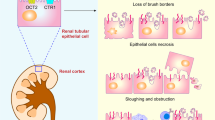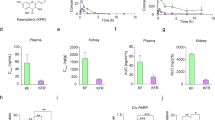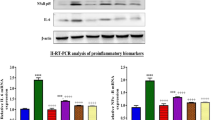Abstract
Cisplatin is one of the most active cytotoxic agents in the treatment of testicular cancer, but its clinical use is associated with side-effects such as ototoxicity, neurotoxicity and nephrotoxicity. Long-term kidney damage from cisplatin particularly affects the proximal tubular apparatus and can be detected by increased urinary excretion of brush-border enzymes, such as L-alanine-aminopeptidase (AAP), and magnesium. In the current study, the flavonoid silibinin was used as a nephroprotectant for cisplatin-induced nephropathy in a rat animal model. Infusion of silibinin before cisplatin results in a significant decrease in glomerular (indicated by creatinine clearance and serum urea level) and tubular kidney toxicity (excretion of brush-border enzymes and magnesium). Silibinin given alone had no effect on renal function. In order to exclude an inhibition of the anti-tumour activity of cisplatin and 4-hydroperoxy-ifosfamide by co-administration of silibinin, in vitro studies were performed in three established human testicular cancer cell lines. Dose-response curves for cisplatin (3-30 000 nmol) combined with non-toxic silibinin doses (7.25 x 10(-6) or 7.25 x 10(-5) mol l-1) did not deviate significantly from those of cisplatin alone as measured by relative cell survival during a 5 day assay using the sulphorhodamine-B staining technique. Also silibinin did not influence the cytotoxic activity of 4-hydroperoxy-ifosfamide (30-10 000 nmol) in vitro. In summary, these in vitro data rule out a significant inhibition of the anti-tumour activity of the major nephrotoxic components, cisplatin and 4-hydroperoxy-ifosfamide, by co-administration of silibinin in a human germ cell tumour cell line model. Together with these demonstrated cytoprotection effects in the rat animal model, these data form the basis for a randomised clinical trial of silibinin for the protection of cisplatin-associated nephrotoxicity in patients with testicular cancer.
This is a preview of subscription content, access via your institution
Access options
Subscribe to this journal
Receive 24 print issues and online access
$259.00 per year
only $10.79 per issue
Buy this article
- Purchase on Springer Link
- Instant access to full article PDF
Prices may be subject to local taxes which are calculated during checkout
Similar content being viewed by others
Author information
Authors and Affiliations
Rights and permissions
About this article
Cite this article
Bokemeyer, C., Fels, L., Dunn, T. et al. Silibinin protects against cisplatin-induced nephrotoxicity without compromising cisplatin or ifosfamide anti-tumour activity. Br J Cancer 74, 2036–2041 (1996). https://doi.org/10.1038/bjc.1996.673
Issue Date:
DOI: https://doi.org/10.1038/bjc.1996.673
This article is cited by
-
Silymarin as a preventive or therapeutic measure for chemotherapy and radiotherapy-induced adverse reactions: a comprehensive review of preclinical and clinical data
European Journal of Clinical Pharmacology (2023)
-
Oxidative resistance of leukemic stem cells and oxidative damage to hematopoietic stem cells under pro-oxidative therapy
Cell Death & Disease (2020)



